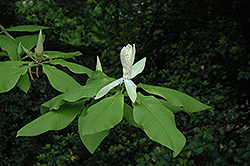It's all about ...
plants

Japanese Whitebark Magnolia
Magnolia obovata
Height: 50 feet
Spread: 30 feet
Sunlight:
![]()
![]()
Hardiness Zone: 5a
Other Names: Japanese Bigleaf Magnolia
Description:
This majestic variety will grow very tall, displaying multitudes of large creamy white flowers in mid spring; large leaves turn a lovely copper gold in fall; late winter or early spring frosts may burn flower buds
Ornamental Features
Japanese Whitebark Magnolia is draped in stunning fragrant creamy white cup-shaped flowers with yellow overtones and burgundy eyes held atop the branches in mid spring. It has dark green evergreen foliage. The large pointy leaves turn coppery-bronze in the fall, which persists throughout the winter. The fruits are showy pink pods displayed in early fall. The furrowed silver bark adds an interesting dimension to the landscape.
Landscape Attributes
Japanese Whitebark Magnolia is an evergreen tree with a distinctive and refined pyramidal form. Its relatively coarse texture can be used to stand it apart from other landscape plants with finer foliage.
This is a relatively low maintenance tree, and is best pruned in late winter once the threat of extreme cold has passed. Deer don't particularly care for this plant and will usually leave it alone in favor of tastier treats. It has no significant negative characteristics.
Japanese Whitebark Magnolia is recommended for the following landscape applications;
- Accent
- Shade
Planting & Growing
Japanese Whitebark Magnolia will grow to be about 50 feet tall at maturity, with a spread of 30 feet. It has a low canopy with a typical clearance of 5 feet from the ground, and should not be planted underneath power lines. It grows at a medium rate, and under ideal conditions can be expected to live for 80 years or more.
This tree does best in full sun to partial shade. It requires an evenly moist well-drained soil for optimal growth, but will die in standing water. It is not particular as to soil type, but has a definite preference for acidic soils. It is quite intolerant of urban pollution, therefore inner city or urban streetside plantings are best avoided. Consider applying a thick mulch around the root zone in winter to protect it in exposed locations or colder microclimates. This species is not originally from North America.
This plant is not reliably hardy in our region, and certain restrictions may apply; contact the store for more information.
